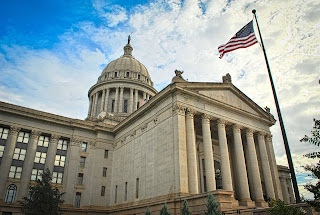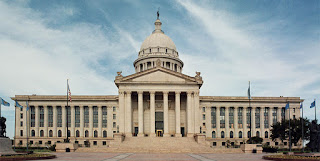Initiative Petition Modernizations Pass House Rules Committee
OKLAHOMA CITY – The process for state questions would be more transparent and modernized under two bills passed by the House Rules Committee on Tuesday.
House Speaker Charles McCall, R-Atoka, authored House Bills 3826 and 3827 to improve the initiative and referendum petition processes used to place state questions on the ballot in Oklahoma.
“These common sense improvements make the petition process more transparent and functional for citizens,” McCall said. “Petitions for state questions are increasingly popular, and government needs to handle these petitions more transparently and efficiently than it does now.”
HB 3827 addresses a lack of transparency in campaign finance for state questions.
The current definition of “state question” used by the Ethics Commission says a state question becomes a state question when the governor sets an election date, which allows campaigns for or against state questions to avoid disclosing donations and expenditures until that time. State question campaigns will often have been accepting donations and spending money for months or even years before an election date is set by the governor.
HB 3827 says a state question becomes a state question when the Secretary of State assigns a state question number, which typically occurs shortly after the petition is filed.
“While some initiative petition groups truly are grassroots citizens, many are out-of-state, well-funded, sophisticated political machines. The public deserves to know the finances and interests behind these campaigns when they are considering signing petitions, just like they deserve to know the same of candidates,” McCall said. “Transparency helps voters make better choices.”
HB 3827 treats state question campaigns more like candidates for office, who are required to begin disclosing fundraising and expenditures once they have raised at least $1,000, regardless of whether they have filed for office.
To modernize the petition signature counting process, HB 3826 authorizes the Secretary of State to use electronic signature counting equipment and software so petition signatures can be cross referenced with the voter registration database maintained by the Election Board. Only registered voters are permitted to sign initiative and referendum petitions.
“It shocks most Oklahomans to know that, in the year 2020, signatures are hand-counted and not cross referenced with voter rolls,” McCall said. “There needs to be a more efficient, accurate way to count signatures than the antiquated process used today.”
HB 3826 requires the initiative and referendum signature gathering form to include each signatory’s printed first name, last name, zip code, house number, and month and day of birth. Any entry not matching three of these five criteria during cross referencing with the voter database would not be counted.
The current petition form collects a signature, printed name, address, city and county. Signature gatherers sign an affidavit attesting to the accuracy and eligibility of the signatures gathered. No further verification is done.
“This bill tightens up a very lax process to improve accuracy,” McCall said.
The bills were presented in committee by Rep. Terry O’Donnell, R-Catoosa.
“Changing the Constitution or state law with a state question is a major action that should not be taken lightly. These bills give voters stronger assurances of transparency and process integrity that are befitting of the magnitude of the matters they may see on their ballot,” O’Donnell said.
The bills now advance to the House floor. If the bills become law, they would take effect in November 2020, meaning they would not affect state questions under consideration this election cycle.





















